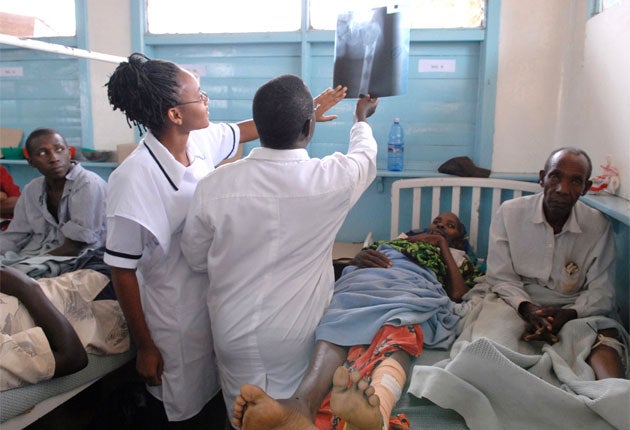Independent Appeal: Technology to heal a nation
Rural African lives are being transformed by clinics with computers and scanners, writes Daniel Howden

Aat ground level, stuck in Nairobi's crawling traffic, the city can seem endless. But seen from the air the sprawl quickly dissipates, giving way in the south to the plains of the national park, in the west to the Indian Ocean and to the north and east, beyond Mt Kenya, to the wilderness.
Yet it is in these remoter stretches of East Africa that much of the population lives. All across the continent, the vast majority of people live in rural areas far beyond the reach of even the modest type of modern medical care that is available in the cities.
The gulf in facilities between research hospitals like Kenyatta in central Nairobi and the handful of clinics in the semi-desert of Mandera near the border with Somalia is vast. But according to Dr Johnson Mussomi, it need not be unbridgeable.
The Kenyan physician has lent his knowledge and expertise to an effort to use low-cost modern technology to dissolve distance and bring "tele-medicine" to an estimated 30 million people across East Africa.
"It may be as simple as two health professionals discussing a case over the phone," Dr Mussomi explains, "or as complex as using satellite technology and video-conferencing facilities to conduct a real-time consultation in different countries." In rural Kenya, telemedicine allows inexperienced doctors to liaise with specialist consultants many hundreds of miles away.
To put it more simply, in the words of Dr Mussomi: "It saves lives."
Computer equipment and training for the project are provided by the UK-based organisation Computer Aid, which is one of the three charities being supported by the Independent's Christmas Appeal this year.
Telemedicine builds on the past success of the better-known Flying Doctors programme, which flew medics to a circuit of rural clinics to treat patients unable to reach urban hospitals. The new project aims both to make more efficient use of the service that Flying Doctors provides, and to open up the new possibilities technology has to offer.
For Dr Mussomi the project provided a reason to come home after 23 years practising medicine further south in Botswana and Namibia.
Having become frustrated at what he calls the "dark days of democracy" when Kenya was ruled as a one-party state and criticism of a creaking health service was forbidden, he decided to see how it was done elsewhere. "No one was supposed to say what was what," he recalled. "But I love the truth, to say what I think."
But when the charity that ran Flying Doctors, the African Medical and Research Foundation (AMREF), offered him the chance to come home and make a real difference in a more open Kenya he jumped at it.
Speaking in his office at Nairobi's Wilson airport, where he runs the Telemedicine outreach programme, Dr Mussomi recalls his own first experience of flying out of Nairobi and into the world in which many of his less fortunate compatriots live.
"It was a shock," he remembers. "My first impression was of people neglected by their own government. The hospitals or clinics had been built but there was nothing in them."
He insists that making a real difference to what these clinics can offer does not require large amounts of money. "If you provide one computer, one scanner and one digital camera, it can change the whole hospital."
With some basic IT facilities, hospitals can produce reports which reveal everything from the number of patients treated, the diseases encountered, and the prevalence of malaria and HIV.
These statistics have radically improved the effectiveness of the Flying Doctors programme, allowing the medical personnel who run it to plan their visits more accurately. The outreach programme was already considered good value, with an average cost of £800 leading to the treatment of up to 100 people.
A pilot project for Telemedicine run over two years in Kenya and neighbouring Tanzania found that pilot sites were now able to send lists of patients with an initial diagnosis, which helps to prepare the specialists, equipment and supplies required; while surgical theatres can now be prepared prior to visits. The time taken to diagnose patients before surgery was also reduced.
As well as enabling clinics to order what they need when they need it, the "e-learning" programme has helped "to end the isolation of rural doctors and nurses", Dr Mussomi explains. It has enabled them to follow the latest developments in treatment and diagnosis via the internet. In one recent case in Kenya, more than 600 computers were supplied by Computer Aid – with the assistance of Accenture – to equip nurses with the clinical skills they needed to serve on the frontline against HIV/AIDS, malaria and other killer diseases. Using the e-learning course, they were able to do the course remotely, allowing nurses to stay in their vital jobs while training.
The kind of problems the programme treats run from patients with cleft palates, which should have been treated when they were babies; to women who have suffered for years with urinary problems after childbirth for want of an operation that takes less than one hour to perform. "In the last year," Dr Mussomi says, "these operations have been able to change the lives of 9,000 people."
Join our commenting forum
Join thought-provoking conversations, follow other Independent readers and see their replies
Comments
Bookmark popover
Removed from bookmarks